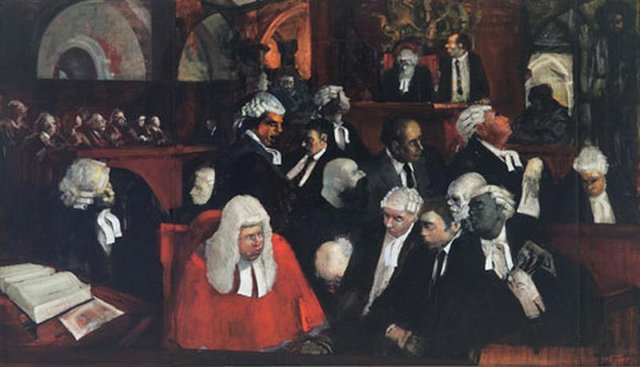The Evolution of Law |BeHistoryBuff|
There should be, and commonly is, a nearby nexus between artificial law and equity – law ought to go for equity. Laws ought to be the target articulations of the way of reality instead of only the subjective biases or impulses of some individual, gathering of individuals, or society in general. Regular law is objective since it is innate in the way of the element to which it relates. The substance of common law is open to human reason. For instance, it is effortlessly comprehended that since every man has a characteristic appropriate to survive, thrive, and seek after his own joy, no other man or gathering of men ought to endeavor to deny him of a picked esteem or activity through the start or risk of compel.
Generally, socially rising thoughts of legitimate standards, in many cases as per the way of reality, happened before their selection by political powers. Intentional types of administration through standard private laws preexisted state law and adequately requested human undertakings. Law emerged as an unconstrained request – something to be found as opposed to authorized. Law is a developmental systemic process including the encounters of an unfathomable number of individuals.
Law as a characteristic result of society
The possibility of law incorporates basic standards of conduct, and additionally establishments and gadgets for evolving, clearing up, refining, and applying the guidelines. Law is a characteristic result of individuals living and cooperating. On the off chance that individuals are to live among others, there must be an approach to determine the unavoidable debate. Law can be viewed as the movement of subjecting human direct to the administration of standards.
The development of law started before history was recorded with laws developed one by one as question were settled. Actually, the improvement of tenets in the public eye originates before both courts and the composed law. For a huge number of years, standard and private legitimate frameworks alone requested human exercises. The force of standard law is found in the way that it is reflected in the lead of individuals toward each other. The further a general public moves far from standard and private law frameworks, the more noteworthy the requirement for laws coercively upheld by the state.
The law is basically found, not made. Law is a systemic disclosure handle including the verifiable encounters of progressive eras. Law reflects and exemplifies the encounters of all men who have ever lived.
Standard law includes suddenly advanced tenets developing through debate arbitration. Standard law gives a fairly solid procedure to finding the common law, since a suddenly advanced and willfully took after custom will probably bring about shared points of interest to the included gatherings than a lead forced by an effective gathering. Regular law is the unchanging standard to which artificial laws must compare so as to be honest to goodness. Regular law is the general collection of guidelines of right direct and equity normal to all men. Comparably, a customary law framework in which law emerges through legal point of reference is superior to anything a framework in which courts and judges simply apply positive laws sanctioned by an administrative body.
Old English Saxon standard law included a gathering people frequently alluded to as a bohr, vowing surety for each of its individuals. In such a game plan, every individual secured his property guarantees by unreservedly tolerating a commitment to regard the property privileges of others, who were required to respond. The gathering would move down this vow of surety by paying the fines of its individuals on the off chance that they were discovered blameworthy of abusing standard law.
The surety assemble had budgetary impetuses to police its individuals and reject the individuals who every now and again and glaringly occupied with undesirable conduct. People would bargain agreeably with those known to be dependable while declining to connect with those known to be dishonest. These solidarity rules advanced suddenly as people used shunning rather than savagery. There is a sure ageless interest to such corresponding contentions. Current parallels to these corresponding intentional assertions can be found in protection organizations, Visa organizations, and credit agencies. Protection offices spread dangers through the joining of benefits. Mastercard organizations remain behind their activities and cases of their individuals. What's more, credit authorities bear witness to the budgetary remaining of their individuals.
A deliberate business law
In the late Middle Ages, the Law Merchant, an expansive arrangement of private trade law that worked through notoriety, credit, and financial ban, directed business exchanges all through Europe. This arrangement of deliberate law rose because of the requirement for regular gauges to administer worldwide exchange. Individuals framed their own broad court framework and lawful request. They depended on layaway reports for requirement and the way that those declining to submit to the framework's tenets and choices would have awesome trouble finding different shippers to work with. Vendors who did not hold fast to the Law Merchant guidelines got themselves excluded from the group of equal business connections.
Bruce Benson(1) has inferred that standard lawful frameworks tend to share the accompanying essential qualities: 1) a solid sympathy toward individual rights; 2) laws upheld by casualties supported by complementary contentions; 3) standard settling methods set up to evade brutality; 4) offenses regarded as torts culpable through financial compensation; 5) in number motivations for the blameworthy to submit to the recommended disciplines because of the danger of social alienation; and 6) legitimate change by method for a developmental procedure of creating traditions and standards.
States amassed enough energy to case restraining infrastructure in law moderately as of late and simply after a long fight with contending lawful frameworks. State law picked up strength in the opposition among medieval European lawful frameworks, for example, Canon law, the Law Merchant, primitive (manorial) law, and so forth. State law progressed to a limited extent to the state's achievement in military triumphs. What's more, the state's energy to charge permitted it to sponsor its lawful administrations. Regal law assimilated the elements of the Law Merchant by receiving its points of reference and authorizing them at lower costs. Imperial law, and in the long run state law, used more prominent coercive power than contending legitimate frameworks which relied on upon correspondence and trust. The state could bring down its expenses and legitimize its cases as the imposing business model wellspring of law by setting up courts supported by the risk of savagery.
Residents in a given topographical region started to see the sovereign as the sole genuine wellspring of law. In the long run, the state defined and forced its own particular laws notwithstanding asserting to be the wellspring of existing standard laws. Early codes of lords were essentially codifications of standard law.
The centralization of illustrious power
The impact of Christianity furnished the royal position with a genuine character along these lines empowering lords to attest a celestial order. At the point when rulers changed illustrious law to assimilate parts of the Church's Canon law, the state's lawful framework picked up the quality and atmosphere of religious law.
Prior to the Norman victory in 1066, administration and law in England were greatly decentralized. William the Conqueror significantly added to the devastation of contending lawful frameworks by finishing the centralization of illustrious power that had been started by Alfred the Great in the ninth Century. William and his successors attempted to bring contending legitimate frameworks under imperial control with a specific end goal to require fines and extra charges that would accumulate to the lord. By 1200, imperial law ruled the lawful request of England and different nations in Europe.
All things considered, most advanced country states developed from nonstatist blackmailer foundations. There was a characteristic movement as tribal war boss got to be lords and kingdoms formed into countries. The coercive state is consequently observed as the wellspring of all law. The presence of coercive organizations and principles smothers the development of willful trust connections. What's more, the development for regarding responsibilities movements to the shirking of discipline from the sovereign state.
As yet, contending legitimate and administration frameworks have kept on existing. Actually, various frameworks have been more normal than unitary frameworks. For instance, in the American West, before government control had achieved the domains, question were settled by private courts. All through its history, America has been the home of wagon prepares, cattlemen's affiliations, mining camps, clubs, places of worship, unions, exchange affiliations, private groups, elective debate determination courses of action (i.e., assertion and intercession), and so forth. Polycentric law actually fills the voids that show up when state laws are observed to need. For instance, casual standard standards are right now adequately managing the Internet. Frameworks of private and standard law depend on individual inspiration and market systems, instead of the state's syndication of force, to give the motivating forces to coordinate and look after request.


Nice article , reading now will commend after the reading :)
Great post - but please add sources ;)
Yes would edit and add sources soon :)
flagged for spamming link in general chat
That is so rude bro , no reason to flag a good content .
please dont flag , it was done by mistake . Please dont flag my hard work .
please dont spam the general channel with your links